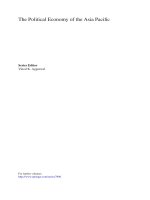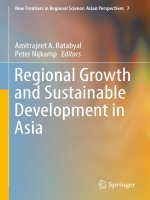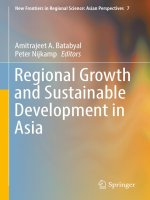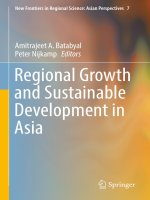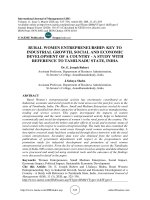Economic growth and economic development 206
Bạn đang xem bản rút gọn của tài liệu. Xem và tải ngay bản đầy đủ của tài liệu tại đây (45.13 KB, 1 trang )
Average Protection Against Risk of Expropriation, 1985-95
Introduction to Modern Economic Growth
.
USA
10
CAN
AUS
NZL
SGP
IND
HKG
BRA
8
CHL
VEN
PRY
URY
MYS
IDN
BHS
TTO MEX
COL PNG
JAM
CRI
MAR
EGY
ECU
ARG
6
GUY
BOL
DOM
PAN
PER
DZA TUN
VNM
LKA PAK
MMR
PHL
HND
NIC
GTM
SLV
4
LBY
BGD
HTI
-5
0
Log Population Density in 1500
5
Figure 4.10. The Institutional Reversal: population density in 1500
and economic institutions today among the former European colonies.
The explanation for the reversal that emerges from the discussion so far is one
in which the economic institutions in various colonies were shaped by Europeans
to serve their own (economic) interests. Moreover, because conditions and endowments differed between colonies, Europeans consciously created different economic
institutions, which persisted and continue to shape economic performance. Why did
Europeans introduce better institutions in previously-poor and unsettled areas than
in previously-rich and densely-settled areas? Without going into details, a number
of obvious ideas that have emerged from the research in this area can be mentioned.
Europeans were more likely to introduce or maintain economic institutions facilitating the extraction of resources in areas where they would benefit from the
extraction of resources. This typically meant areas controlled by a small group of
Europeans, as well as areas offering resources to be extracted. These resources included gold and silver, valuable agricultural commodities such as sugar, but most
importantly, what is perhaps the most valuable commodity overall, human labor.
192



